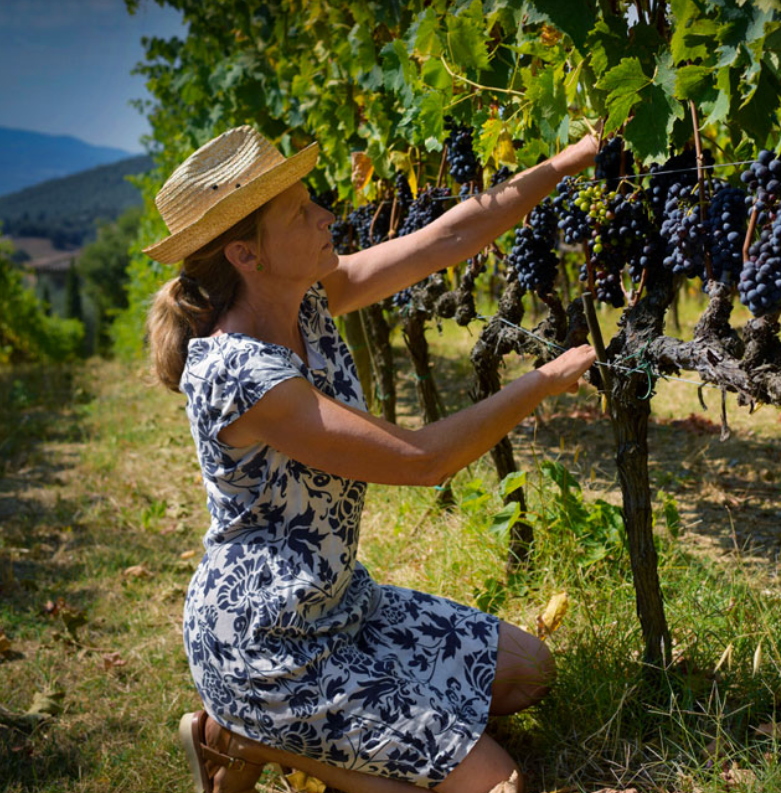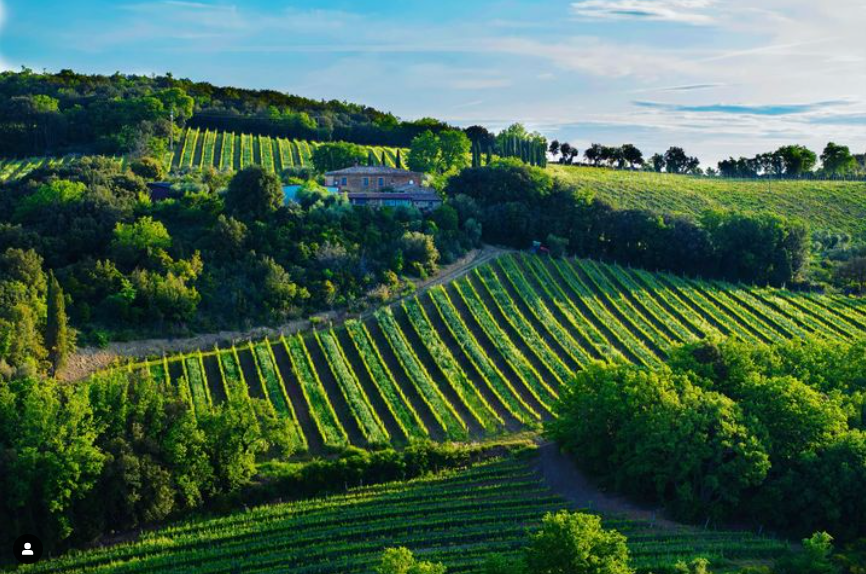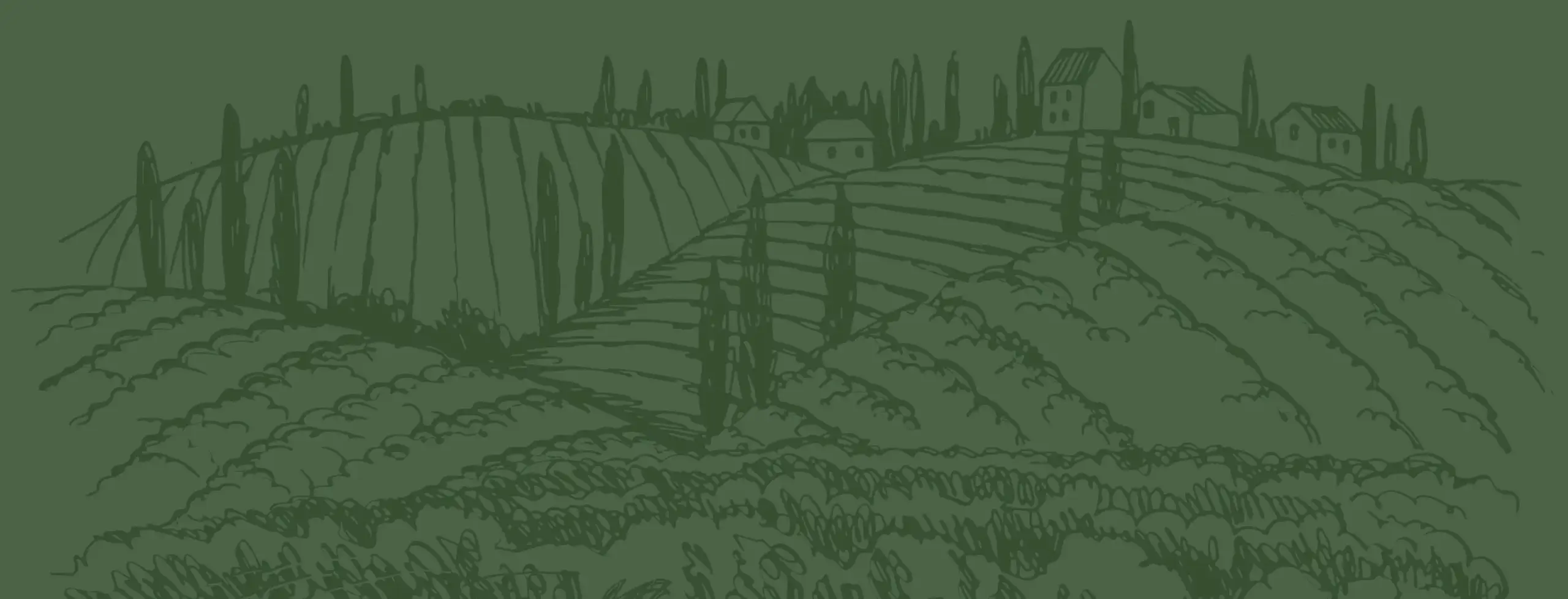Grower Q&A: Katia Nussbaum

Katia Nussbaum is the driving force behind one of Italy’s most regenerative vineyards, San Polino Brunello di Montalcino.
What does ‘regenerative viticulture’ mean to you?
As I see it, regenerative viticulture means that we (ourselves) and the vines and the soil and everything organic in the vineyard and surrounding areas are all equally part of a giant ecosystem, a common nutrient cycle, the only independent entity being the sun, from which everything else takes life. The act of nurturing a mutually beneficial nutrient cycle is the act of regenerative practices, which by their nature ripple out far beyond the vineyard, winery into the community and beyond. Any non-regenerative system will ultimately be doomed to fail, clearly illustrated by the state of the world today.
What was your ‘Aha!’ moment for regen?
The “Aha!!” moment came the first time I heard the word “regenerative”. It made total sense : Aha!! regen describing the ineluctable logic of the world as it works while creating new ways of seeing, being, communicating and acting A re-positioning of ourselves in nature.
Before, we had a host of separate words, all describing separated things: economics, politics, dialectics, organic, biodynamic, equality, mutualism. Suddenly “Aha!”: Regenerative. A word for action and practicality, large enough to encompass into one framework all the reductive parts of a previously dislocated world map.
A second “Aha!”: Yes, we always knew that chickens come home to roost. The world will burn if we don’t tend to it, and people will fight back if oppressed. “Aha!”: with a simple word Regenerative provides an alternative framework through which to work for a more balanced world.
What’s the most important change you’ve introduced or that’s made the biggest difference?
In 2003 the Brunello di Montalcino territory faced the problem of the “red spider”, a mite which sat on the vine leaves and sucked the lymph from the plant, thus drying the leaves and mortally damaging the crop. The organic certifiers ruled that just for the very once, organic producers should be allowed to use pesticides as they could see no other solution. Instead we signed up to an experimental project being run by the University of Florence faculty of agriculture. They told us that the red spider predator mite had been wiped off the face of vineyards due to heavy use of sulphur, most damaging in its powdered form. In the summer of 2003 we spent half out time pulling off leaves with the presence of the red spider, putting them in plastic bags to remove from the vineyard. Thus we saved our 2003 harvest. In the following spring we took cuttings from a vineyard in the north of Italy with healthy egg populations of the predators and wrapped them around the trunks of our leafing vineyard. In this way were we able to reintroduce the old species back into the vineyard and, it goes without saying, we have never use powdered sulphur again. The experiment was a great success and we gave cuttings from our vineyards to other Montalcino producers.
This is just one example of how shared information can make a great difference.
We have done so many things over the years, each one a drop in the vast ocean of change, but little by little changes accumulate. Probably the most important change has been that of attitude and the shift to the regenerative way of thinking.
Which creature are you most pleased to have encouraged to your land?
Microroganisms ( I am in the plural) which we spray into the vineyards during the spring and summer months: ones that work as predators to downy and powdery mildew, and those which fill ecological niches to prevent rogue bacteria/fungal colonization on the leaves and grapes themselves leading up to harvest.
Who do you turn to when you need support?
We talk to local agronomists, and fellow wine-makers. Regarding cover crops and the planting of wild flowers we took advice from our biodynamic organization. For the vitiforestry we talked to the Italian Agroforestry Institute (of which we are members), we read and take much inspiration from online lectures and seminars, such as those organized by yourselves.
Is there a regen practice that turned out to be super easy and cheap to implement?
The leaving of hedgerows and patches of woodland as ecological corridors, the planting of fruit trees and the not mowing of green areas around the vineyards, for example.
What’s your top regen tip?
Take it easy, think and feel good about asking for help/advice. Give advice kindly, knowing that it’s only advice. Try to enjoy the work around winemaking and viticulture, don’t just focus on the wines.
What would you tell a younger version of yourself, just setting out growing grapes?
Have fun, passion, confidence; be yourself, be open and everything will come back to you.
What would an idealised version of a ‘perfect’ regen vineyard feel like?
Fantastic, optimistic, inspiring, stimulating, loving.

Is there a piece of technology that has made a real difference?
The wheel. Only joking. I can’t really think of one. Perhaps my magnifying glass?
Are you currently experimenting with any field trials?
Vitiforestry.
How do you control fungal diseases?
Green leaf pruning around the grape clusters and microbiological sprays as predators of fungal diseases and ecological niche fillers/competitors. Does it always work? No, particularly in these times of climate unpredictability. We use diluted sulfur and copper yet try to keep these to a minimum. The copper is particularly not ok and we are desperately looking for an alternative. Any ideas?
What do you listen to while you’re working?
At the moment debates about consciousness. What and why it is, I believe that the soil, as an ecosystem, may be conscious, I can’t see any valid reason why not. My next intellectual quest will be to prove that a bottle of wine can be conscious, the wine inside, not the bottle!!
If you had a superpower what would it be?
There’s that saying: “I turn Grapes into Wine. What’s your superpower?” My superpower would be patience, calm and clear headed thinking.





